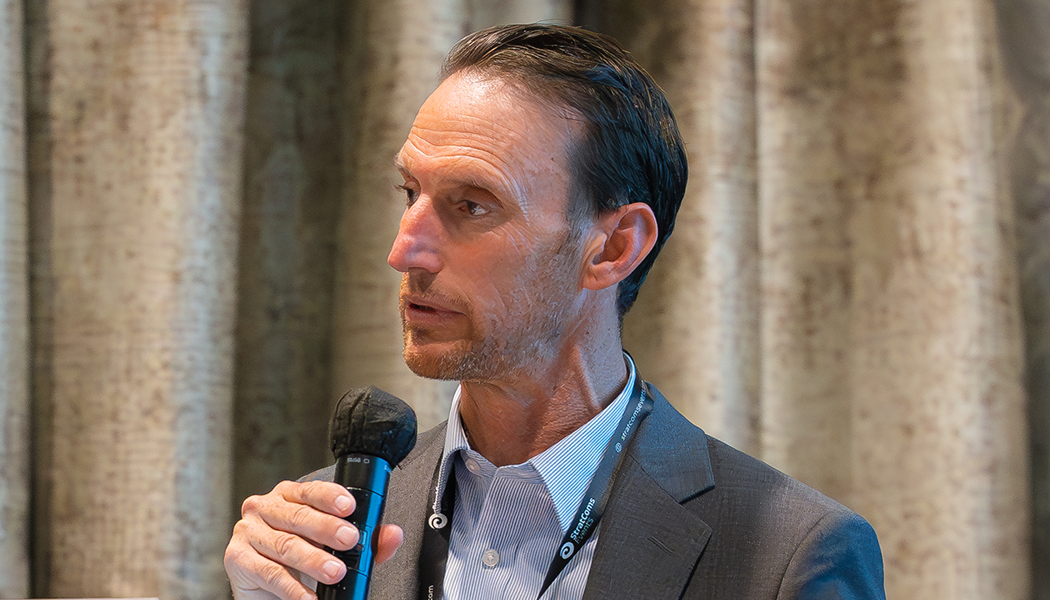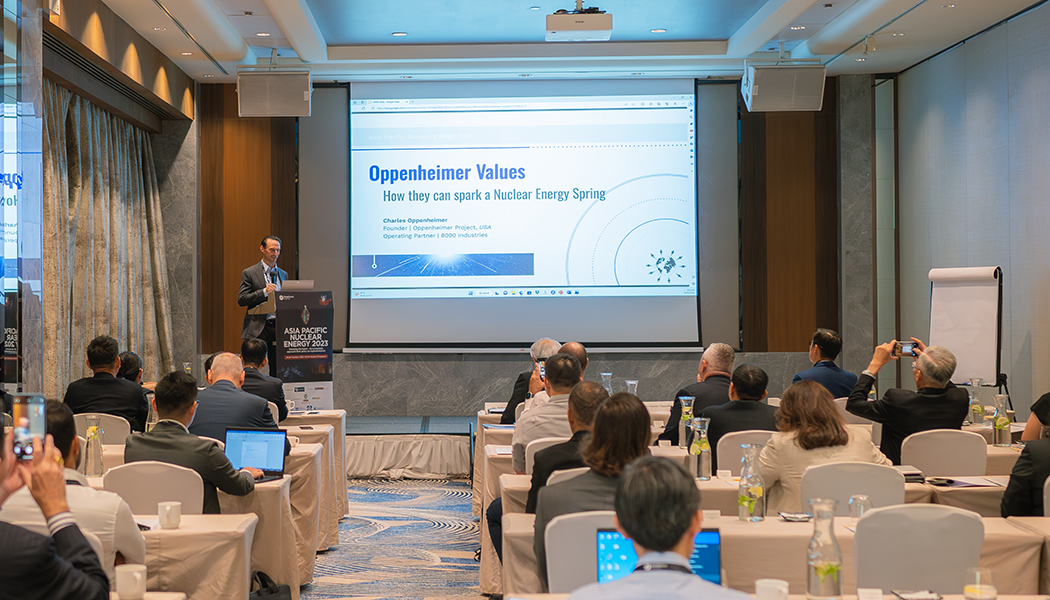SINGAPORE — October 19, 2023 — Anthropocene Institute was honored to sponsor the Asia Pacific Nuclear Energy 2023 event in Singapore and to introduce key partner Charles Oppenheimer, Founder, Oppenheimer Project/Operating partner 8090 Industries USA, as a keynote speaker. In his presentation, Charles reminded the audience of his grandfather Robert’s values: science is a force for good, and humans must unite or they will perish. “Nuclear energy was the first version of a technology that mapped this trajectory toward global interdependence – but it’s an ongoing trend,” he said. “Everything from AI to pandemics and climate change make it starkly clear that our existence only grows more interdependent with scientific progress. Now that we face the dual threat of climate change and nuclear weapons, we have a common solution — fission.”
Charles noted that we can learn a lot from our past, and the fact that we nearly avoided the arms race. The Acheson-Lilienthal Plan of 1946 called for joint control of fissile material between the US, UK, and USSR. Under the terms of the plan, nations had to give up advantage in weapons in exchange for a shared stake in controlling fission for peaceful use. “Since 1949, the world has produced over 70,000 nuclear warheads, but not nearly enough nuclear energy,” said Oppenheimer. “Just as the arms race was an avoidable policy choice and not an inevitability of scientific progress, humanity now sits at a precipitous moment.
He noted that we must choose unity over tribalism, scientific openness over secrecy, and determine our shared lights and values. Nuclear energy, he believes, is the bridge builder that will help us turn toward peace instead of conflict. “We don’t need perfect peace to start,” he said. “The US should have cooperated with the Soviet Union in 1946 on nuclear energy, and we should cooperate with China today.”


Following the keynote, Mr. Oppenheimer was joined by panelists Meng Hwee Chia, Deputy Director, Energy Technologies Department, Energy Market Authority, Singapore; Shigeru Kimura, Special Advisor on Energy Affairs, Economic Research Institute of ASEAN and East Asia (ERIA), Indonesia; Vaclav Bartuska, Ambassador at Large, Energy Security, Ministry of Foreign Affairs, Czech Republic; and moderator Nobuo Tanaka, Chair, Steering Committee of Innovation for Cool Earth Forum (ICEF), Executive Director Emeritus, International Energy Agency (IEA), CEO, Tanaka Global, Inc., Japan.
The keynote panel session, themed “Collaborative Strategies to meet rising energy demands in Asia Pacific —climate crises, ensuring safety and energy security in the Asia Pacific Energy Transition,” brought together experts to assess the economics, current market conditions, and development and implementation opportunities for nuclear energy as part of the energy transition for the current and future energy mix. Panelists discussed the energy crisis and the fact that fossil fuels still make up 83 percent of Southeast Asia’s energy mix. At the same time, energy demand is expected to increase exponentially, exposing these countries to increasing economic, energy security and geopolitical risks – and the dire need to balance energy security, energy equity, and energy sustainability.
“There’s obviously a big gap between presentations like the one we just saw with a focus on energy transition and clean energy — and nuclear energy isn’t mentioned once,” said Oppenheimer. “In this room, there are a lot of people who are pro-nuclear-energy and involved in engineering and rational ways we can get there, so how do we close that gap? On an individual project basis, if you can’t justify one project financially, then you can’t get to the larger scale. That is the role for governments: to backstop that. At a larger scale, if we know the economy doesn’t support a single big project but six years from now we need carbon-free energy, it’s the government’s role to help fund larger, bigger nuclear projects.”
Hosted by StratComs Events in collaboration with Centre for Strategic Energy & Resources, APNE is the first nuclear energy summit focused on developing nuclear energy in the Asia Pacific region particularly the ASEAN countries that are currently looking at nuclear energy as a possible addition to their countries’ energy mixes considering growing energy demands. The panelists agreed that developing nuclear energy is environmentally sustainable in the green taxonomy to decarbonize the power sector and go beyond net zero.